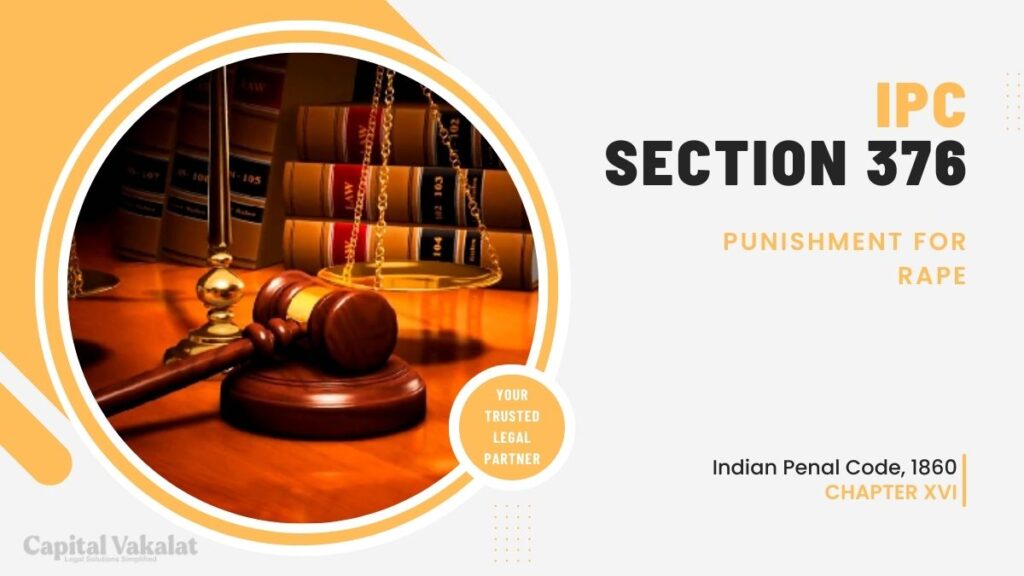Rape, a heinous crime that violates the sanctity of an individual, is addressed under Section 376 of the Indian Penal Code (IPC). This legal provision serves as a cornerstone in the fight against sexual violence, encompassing various aspects to ensure justice is served.

Understanding the intricacies of Section 376 is crucial in comprehending the legal landscape surrounding rape in India.
Elements of Section 376 IPC
In its essence, Section 376 delineates the elements constituting rape. Central to these elements is the concept of consent, a fundamental aspect that distinguishes consensual acts from criminal violations. The section also delves into the age of consent, recognizing the vulnerability of minors in the face of sexual exploitation. Force and coercion, integral components, further define the gravity of the offense.
Categories of Rape under Section 376
Within the ambit of Section 376, various categories of rape exist, each shedding light on different dimensions of sexual offenses. Marital rape, often a contentious issue, challenges societal norms, while custodial rape highlights the abuse of power within institutions. The disturbing phenomenon of gang rape, involving multiple perpetrators, emphasizes the need for a comprehensive legal framework.
Legal Consequences for Rape Convictions
The legal consequences for those convicted under Section 376 are severe, reflecting society’s condemnation of such acts. Imprisonment, fines, and compensation to the victim constitute the punitive measures. Moreover, the requirement for sex offenders to register is a proactive step to monitor and restrict their movements.
Challenges in Prosecuting Rape Cases
Despite legal provisions, prosecuting rape cases presents multifaceted challenges. The burden of proof often falls heavily on the victim, leading to underreporting and low conviction rates. Victim blaming and the pervasive social stigma associated with rape further complicate the legal process.
Amendments and Evolving Legal Landscape
Over time, Section 376 has undergone amendments to adapt to the evolving understanding of sexual offenses. These changes aim to enhance the effectiveness of the legal system in addressing rape cases. Examining the impact of these amendments provides insights into the shifting dynamics of justice delivery.
Role of Technology in Combating Rape
In the contemporary era, technology plays a pivotal role in both the commission and prevention of rape. Forensic evidence, including DNA analysis, has become instrumental in establishing guilt or innocence. Additionally, advancements in reporting mechanisms, such as anonymous helplines and online platforms, contribute to breaking the silence surrounding sexual violence.
Global Perspectives on Rape Legislation
A comparative analysis of rape legislation globally reveals diverse approaches to tackling sexual offenses. International conventions and treaties underline the concerted efforts of the global community to eradicate rape and protect the rights of victims. Understanding these perspectives enriches the discourse on effective legal frameworks.
Societal Impact and Awareness
The impact of Section 376 extends beyond courtrooms and legal statutes. Changing societal attitudes towards rape, driven by advocacy and education, are crucial in preventing such crimes. The article explores the role of awareness campaigns and educational initiatives in fostering a safer and more informed society.
Conclusion
In conclusion, Section 376 IPC stands as a formidable tool in the fight against rape, providing a robust legal framework to address sexual offenses. The comprehensive examination of its elements, categories, legal consequences, and challenges underscores the complexity of addressing rape within a legal context. As society evolves, so must the legal system to ensure justice for victims and the prevention of future crimes.
Frequently Asked Questions
What is the role of consent in rape cases?
Consent is crucial; any sexual act without clear and voluntary consent is deemed a violation under Section 376.
How can technology aid in prosecuting rape cases?
Technology, such as forensic evidence and online reporting mechanisms, enhances the evidentiary process and encourages reporting.
Are there efforts to amend Section 376 to address emerging challenges?
Yes, amendments are periodically introduced to address evolving challenges and enhance the effectiveness of the legal framework.
What steps can be taken to reduce societal stigma around rape survivors?
Education, awareness campaigns, and destigmatization efforts are essential in reducing societal stigma and supporting survivors.